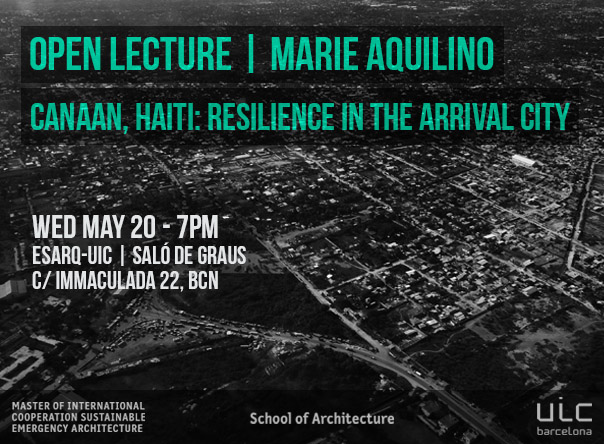 This Wednesday, post-disaster reconstruction expert Marie Aquilino will be giving an open lecture on her experience working in the city of Canaan, Haiti after the devasting earthquake in 2010. We urge anyone interested in this field of work to take advantage of this opportunity and join us in this seminar.
This Wednesday, post-disaster reconstruction expert Marie Aquilino will be giving an open lecture on her experience working in the city of Canaan, Haiti after the devasting earthquake in 2010. We urge anyone interested in this field of work to take advantage of this opportunity and join us in this seminar.
“Four years ago virtually no one lived on this huge swath of dusty territory; the fragile and suffering hills tainted by erosion and extreme exposure immediately north of Port-au-Prince, Haiti’s capital. Born out of crisis, shock, desperation, hope, chance, failed promises, and defiance the region known as Canaan has become a small city. Today nearly 40,000 families have built their homes here, one-third of these as an investment in a future residence. Such “arrival” cities will radically alter our future and change the nature of urban space, forcing us to question everything about the way we live together in cities: from how we govern to what we eat; and from how we share resources to the role of innovation. These arrival cities hold the promise of change and creativity as much as they do the dangers of resentment and exclusion.” – Marie Aquilino
Marie has collaborated with our program since 2013 when she gave her first open lecture, and is joining us this year as guest juror for our students’ final thesis presentations. You can read more about her experiences in Haiti at her Metropolis column and in her recent online publication, Abiding Architecture.
Marie Aquilino (PhD, Brown University) is professor of architectural history and a specialist in contemporary urban redevelopment at École Spéciale d’Architecture, where she leads a program that educates and trains architecture students to work in the context of extreme need and crisis in the developing world. She is currently part of an international working group on the reconstruction of Haiti, and is a recent laureate of the Partner University Fund for her work in Titanyen. Marie is also the editor and one of the authors of Beyond Shelter: Architecture and Human Dignity (Metropolis Books, 2011), which features 25 reports from the field by leaders of architecture studios, engineering firms, non-profits, research centers, and international agencies that are working to provide sustainable recovery efforts in a wide range of urban and rural locales. Since the book’s release, she has continued to advocate for a sea change, one that radically shifts our thinking and practice from short-term emergency aid to investment in long-term development.

